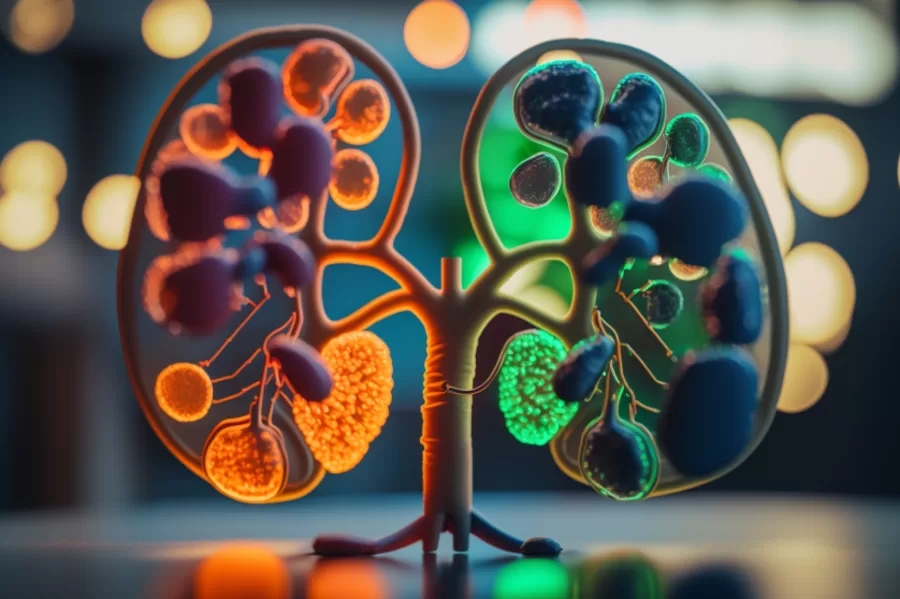The significance of kidney function should not be underestimated since kidney failure may result in the accumulation of toxins and fluids in the human body, leading to unpleasant health issues and complications that may be potentially dangerous to life. Thus, let’s consider how you may take care of your kidney health by performing simple actions.
Understanding Kidney Function
The kidneys are important organs that are in charge of filtering waste and excess fluids from the body, supporting electrolyte balance in the human body, and regulating blood pressure. This organ likewise produces hormones that stimulate the production of red blood cells. In general, the kidneys play a vital role in supporting the internal environment of the human body and overall health. If kidneys function wrong, serious and dangerous health issues may appear.
Waste removal
The kidneys take a significant part in removing waste and excess fluids from the human body. Daily the kidneys may filter nearly 120-150 quarts of blood to remove waste products and excess fluid, which are withdrawn in urine later. The kidneys filter out such waste products as urea, excess salts, creatinine, toxins, uric acid, and drugs.
Blood pressure regulation
The kidneys likewise play an important role in regulating blood pressure in the human body. This becomes possible at the expense of controlling the balance of salt and water in the human body and the production of hormones that may assist in constricting or dilating blood vessels. Once the kidneys function improperly, blood pressure may become unstable, resulting in various health issues.
Electrolyte balance
The kidneys aim to support electrolyte balance in the human body. Electrolytes are minerals and ions that are necessary for correct cellular function and take part in different physiological processes in the human body, for instance, fluid balance, nerve and muscle functions, etc.
The kidneys assist in regulating electrolyte balance by selectively holding and highlighting definite minerals and ions, in particular, calcium, sodium, magnesium, and potassium.
Red blood cell production
The kidneys are irreplaceable since they are responsible for the production of red blood cells in the human body. Red blood cells play a crucial role in transporting oxygen from the lungs to the tissues of the body and removing carbon dioxide from the tissues, which is output from the body through the lungs later. The kidneys produce erythropoietin hormone which is in charge of stimulating the production of red blood cells in the bone marrow.
Factors Affecting Kidney Function
As a rule, there are certain factors that may affect kidney function. One of the most widespread factors is the age of the individual, genetics, underlying health conditions, chosen lifestyle, etc. Since these factors may greatly affect kidney function, it is crucial to take measures for defending your kidney wellness by sticking to a healthy lifestyle, controlling chronic conditions, and more.
Age
Age is considered an important factor affecting kidney function. As people age, kidneys start to undergo alterations naturally that may decrease their overall function. These alterations involve a reduction in the number of nephrons, a decrease in blood flow to the kidneys, and a reduction in the glomerular filtration rate.
The decrease in kidney function with age may result in an increased risk of developing kidney disease and different related health issues, in particular, high blood pressure and heart disease.
Genetics
Genetics may be regarded as a crucial factor affecting kidney function as well. Usually, there are a few genetic conditions that may cause kidney disease, for instance, Alport syndrome, Fabry disease, polycystic kidney disease, etc. As a rule, mutations in certain genes that affect the structure and function of the kidneys may cause these conditions.
Underlying health conditions
Underlying health conditions are another factor affecting kidney function. Unfortunately, a few health conditions may damage the kidneys and worsen their ability to filter waste from the blood. Diabetes, high blood pressure, autoimmune diseases, urinary tract infections, kidney stones, cancer, and chronic kidney disease are considered the most widespread health conditions that may affect kidney function.
Lifestyle
Your lifestyle may have a great impact on overall health wellness and, in particular, kidney function. Definite lifestyle habits may create a load on the kidneys and boost the risk of developing kidney disease. For instance, a diet you are sticking to, lack of physical activity, smoking, alcohol consumption, medications and supplements intake, etc. are major lifestyle factors that may affect kidney function negatively.
Strategies for Improving Kidney Function
If kidneys function wrong, this may lead to unpleasant consequences. Fortunately, there are a few strategies that may assist in improving kidney function or slowing down the progression of kidney disease. Some of these strategies are staying hydrated, following a healthy diet, exercising regularly, and more. Note that you may consult your doctor to develop a personalized plan for managing kidney function and preventing further kidney damage.
Hydration
Staying hydrated is necessary for supporting good kidney function. Drinking enough fluids may assist in flushing out waste products from the kidneys and preventing dehydration, which may cause a load on the kidneys and result in decreasing kidney function over time.
Dehydration may likewise boost the risk of developing kidney stones and urinary tract infections, which may damage the kidneys further.
Diet to improve kidney function
Sticking to a balanced diet is a significant strategy for improving kidney function. A healthy diet may assist in decreasing the load on the kidneys and granting the nutrients required for optimal kidney function. Limiting sodium, consuming adequate protein, limiting phosphorus, and selecting healthy fats are the most common dietary pieces of advice for improving kidney function.
Foods to include
Adding definite foods to your diet may assist in improving kidney function by granting nutrients and antioxidants that defend the kidneys and contribute to overall health. Make sure you include the following foods in your diet: diverse colorful fruits and vegetables, lean proteins, whole grains, fatty fish, leafy greens, egg whites, etc.
Foods to avoid
While some foods may be useful for improving kidney function, others may be harmful to the organ. If you experience kidney disease or intend to improve your kidney function, it is necessary to limit or avoid definite foods that may bring nothing good to the kidneys. Processed and packaged foods, high sodium foods, dairy products, and foods high in potassium and phosphorus are the most harmful foods for kidney function and that’s why they are worth limiting or avoiding.
Fitness and its impact on improving kidney function
Physical fitness may be an essential component of improving kidney function. The reason is that it may assist in lowering blood pressure and improving overall cardiovascular health. Some recommendations for incorporating fitness into your daily life to improve kidney function are as follows: engaging in regular aerobic exercise (walking, jogging, cycling, or swimming), incorporating resistance training, and adding stretching and flexibility exercises.
Recommendations for Improving Kidney Function
The above-discussed strategies are useful for improving kidney function. What’s more, there are a few more recommendations you may take into account to ensure kidney function properly. Some of these tips are managing blood sugar levels and blood pressure, quitting smoking, and checking up regularly.
Blood Pressure Management
Blood pressure management is a significant facet of improving kidney function. Hypertension or high blood pressure may cause damage to the blood vessels in the kidneys, resulting in reduced kidney function over time. To manage your blood pressure, you may monitor your blood pressure regularly, take prescribed medication, stick to a low-sodium diet, etc.
Managing Blood Sugar Levels
Managing blood sugar levels is likewise crucial for improving kidney function, particularly for individuals with diabetes. High blood sugar levels may cause damage to the blood vessels in the kidneys. This may result in reduced kidney function over time.
Quitting Smoking
Smoking is harmful to the overall health of the person. Moreover, smoking may damage blood vessels and reduce blood flow to the kidneys. As a result, kidney function may be reduced. The solution is to quit smoking to improve kidney function.
Regular Check-ups
Regular check-ups with a doctor are essential for monitoring kidney function and discovering any potential problems at an early stage. As a rule, it is advisable to check kidney function at least once a year for individuals who experience kidney disease. In some cases, it may be necessary to check kidney function more frequently if a doctor advises this.
Summary
Kidneys are responsible for lots of important processes in the human body, in particular, filtering waste products and excess fluids, supporting electrolyte balance, regulating blood pressure, and many others. That’s why it is vital to keep your kidneys healthy. For this, you may make use of the above-discussed strategies and recommendations for improving kidney function.
FAQ
Can kidney function ever improve?
Yes, in the majority of cases, kidney function may improve with the assistance of appropriate treatment and lifestyle alterations.
How can I rebuild my kidney function?
If you intend to rebuild your kidney function, a few steps you may take are as follows: adhering to a balanced diet, staying hydrated, exercising regularly, managing blood sugar levels and blood pressure, avoiding smoking and alcohol drinking, checking up regularly, etc.
What is the best thing to drink for your kidneys?
As a rule, water is the best thing to drink for your kidneys. It is necessary to stay hydrated to assist in flushing out toxins and waste products from your body, which may contribute to healthy kidneys.
Can your GFR go back up?
As a rule, GFR (glomerular filtration rate) may be improved or increased. The GFR is an indicator of kidney function, which implies that a higher GFR points out better kidney function.





